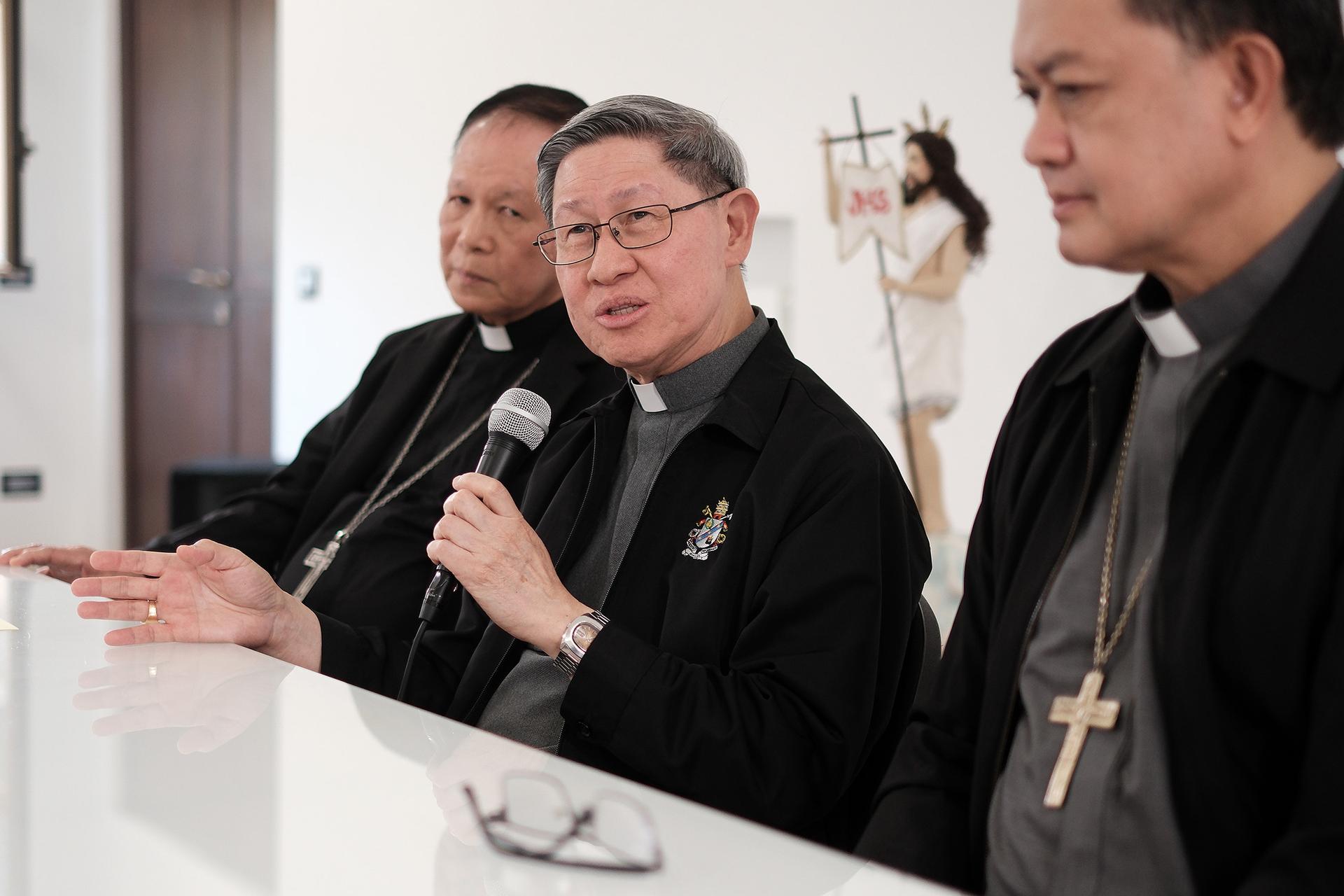MANILA, Philippines – Filipino Cardinal Luis Antonio Tagle said he was confident that Pope Leo XIV would continue the programs of the late Pope Francis for the poor and neglected, even if these projects might take “different expressions.”
Tagle, the 67-year-old pro-prefect of the Dicastery for Evangelization, said his answer to this question of continuity is a “resounding yes.”
“Now, will the programs be clones or photocopies? The programs may evolve, and they may take different expressions. But there’s no turning back from that,” Tagle said in a post-conclave press conference on Friday at the Pontificio Collegio Filippino, the residence of Filipino priests studying in Rome.
The cardinal cited the background of Leo, formerly Cardinal Robert Prevost, as a longtime missionary and bishop in Peru.
“He himself has been exposed to situations of poverty, climate change, indigenous peoples, and refugees. He knows all that. He has experienced all that. So I cannot imagine how, as Pope, he would lose that kind of compassion. It might even deepen further,” Tagle said.
The former Manila archbishop, who started working at the Vatican in 2020, also suggested that Francis’s “response” within the Roman Curia might need reevaluation.
“Pope Francis’s response within the Curia was one form. There’s nothing wrong with reevaluating it, and checking if there are other effective ways of helping,” the cardinal said, noting that Francis’s programs for the homeless also evolved through the years.
Leo, in his Urbi et Orbi blessing on Thursday, emphasized the need to “be a synodal Church, a Church that moves forward, a Church that always seeks peace, that always seeks charity, that always seeks to be close, above all, to those who are suffering.”
The 69-year-old Pope later told the College of Cardinals that he wants to renew their “complete commitment to the path that the universal Church has now followed for decades in the wake of the Second Vatican Council.” Leo said it was a path that was “masterfully and concretely” set forth by Francis in his apostolic exhortation Evangelii Gaudium.
These first words of Leo fueled hope for continuity after the 12-year papacy of Francis.
Filipino Cardinal Pablo Virgilio David, 66, said he was happy when he was listening to Leo’s Urbi et Orbi, “because he almost summarized our discussions in the congregations of the College of Cardinals.”
The general congregations, which took place ahead of the conclave, allowed cardinals to speak about the situation of the Church and the world, and their hopes for the next Successor of Peter.
David, president of the Catholic Bishops’ Conference of the Philippines and bishop of the Diocese of Kalookan, said the “most prominent” topic they discussed was the role of the pope as pontifex maximus or “supreme bridge-builder.” The pope, from this perspective, is always “a symbol of unity” as well as building bridges.
“I can safely say a majority of the cardinals would like to see a continuity of the spirit of the papacy of Pope Francis without being a clone, without being a photocopy,” said David. “Every pope is going to be original.”
David said he was elated when he heard Leo mention Francis during his Urbi et Orbi. “When I heard it from his mouth, I said, ‘Oh, he treasures the memory of Pope Francis.’ And that’s a big deal for us. I think that was also a big deal for most of the cardinals. You know how much we loved Pope Francis. I think the whole world fell in love with Pope Francis,” he said.
David noted Francis’s characteristics as “a pope of mercy and compassion” who pushed for “a welcoming Church” and a “listening Church” with much humility. “I’m seeing these now in the personality of Pope Leo, and so let’s pray for him. I’m full of hope in my heart that this is going to be a really good papacy.”
For Filipinos, in particular, David said it also “matters a lot that we have a pope, a spiritual leader, whose heart really beats for migrants.”
More than 10 million Filipinos have chosen to live and work abroad because of the lack of jobs back home. Leo’s election struck a chord among many Filipinos because of his background as an American sent as a missionary to Peru.
“In that regard, I think that he would sustain the direction of Pope Francis,” said David, describing the late pontiff as “very sympathetic” toward migrants.
David said the care for refugees and migrants was a frequent topic in their general congregations. The discussions took place in the context of the rise of an “anti-immigrant” stance “because of the return of nationalism,” as well as the “tendency to associate migrants with criminals.”
Tagle, the former president of Caritas Internationalis, said he hopes that “the human face of the migrants” is recovered.
“‘Migration’ is often discussed, but these are persons. Each migrant is a person,” Tagle said.
He differentiated between “migration by choice” and “forced migration.” Forced migrants, he said, “become victims of human trafficking,” which is “one of the biggest businesses now” that is said to have surpassed even the illegal drug trade.
“For us Filipinos, many of us are forced migrants. But in the hands of God, our migrants become missionaries. In many places around the world, Filipinos bring their religiosity,” Tagle said.
Francis had praised Filipinos in jest as “smugglers of the faith.”












